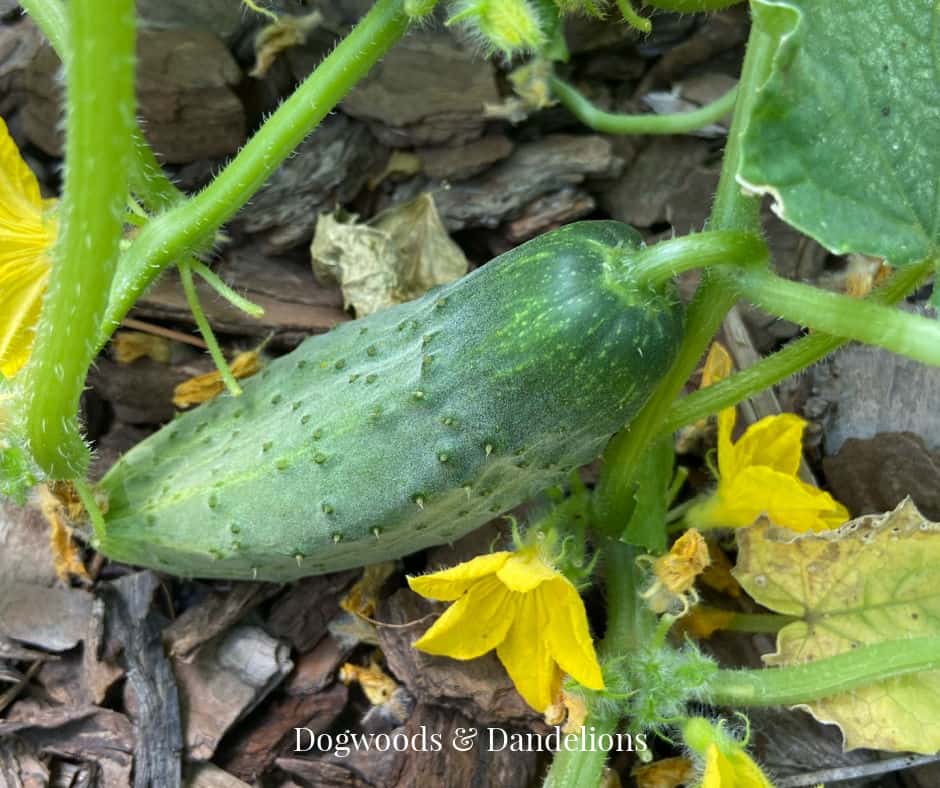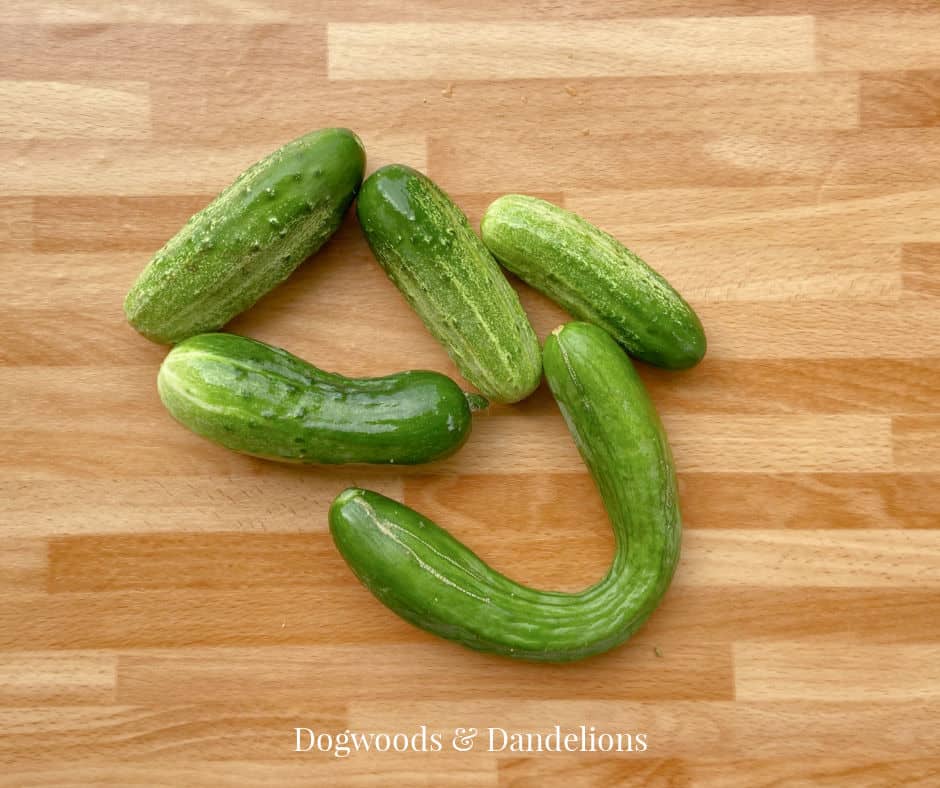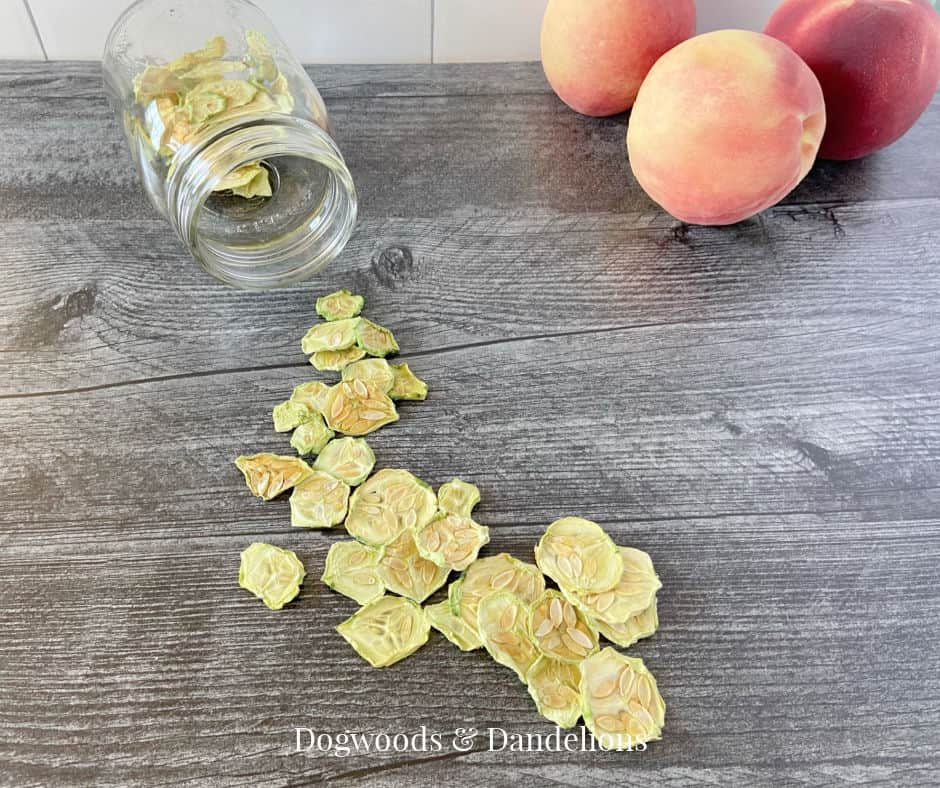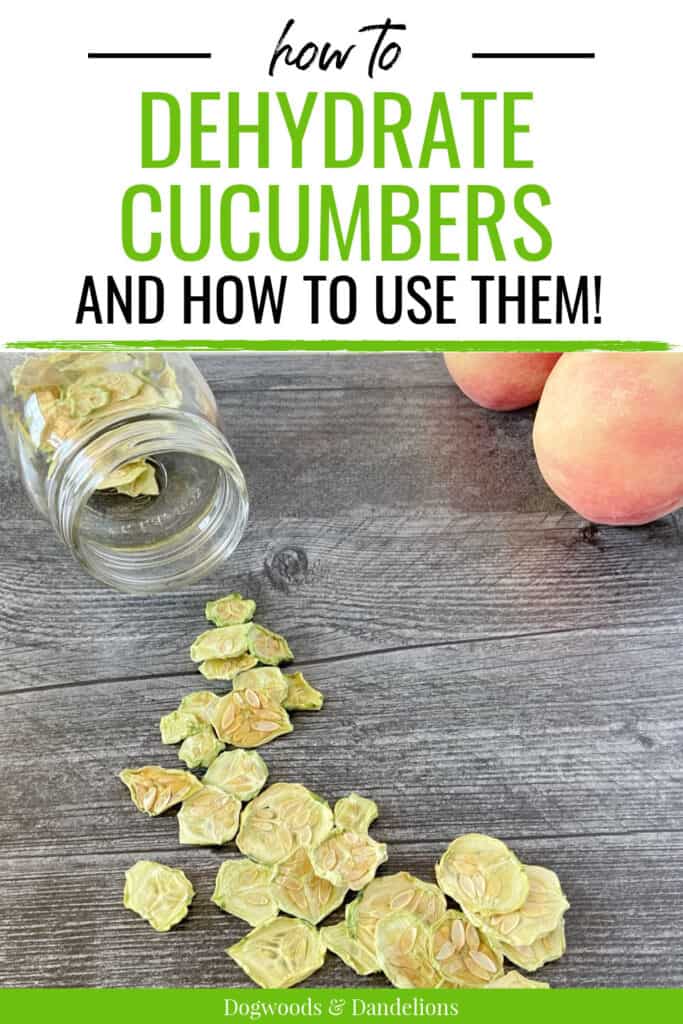How to Dehydrate Cucumbers
Inside: Learn how to dehydrate cucumbers and how to use cucumbers once you rehydrate them.
Dehydrating may not be the first thing you think of when you want to preserve cucumbers. But it is an excellent option, especially since they take up so little space once they are dehydrated. Keep reading to learn how to dehydrate cucumbers and how to use them once dry.
How to Choose the Best Cucumbers for Dehydrating
First, choose small to medium size fresh cucumbers. Cucumbers that are overgrown will be very seedy and won’t have the best flavor. The seeds tend to turn tough once dehydrated, especially if they are large.
Try to find unwaxed cucumbers. If your cucumbers come from your garden or the farmer’s market, they won’t be waxed. However, if you can only find waxed cucumbers, you can still dehydrate them, they will just need to be peeled first.

Affiliate Disclosure: Please note that some of the links in this article may be affiliate links and I may receive a small commission if you purchase something through a link. It will not change your cost. As an Amazon Associate, I earn from qualifying purchases. For more information, see my disclosures page.)
Tools You Need to Dehydrate Produce
If you are new to dehydrating, you will need a few tools. First, you need a dehydrator, especially if you live in a humid area.
While some people have success sun-drying their produce, it is much more difficult to get your fruits and vegetables completely dry using only the sun. Plus, you have to figure out a way to keep the insects off your fruits and vegetables as well.
If your oven goes low enough you can attempt to dehydrate your cucumbers in the oven. But if you are going to dehydrate many items, a simple dehydrator will quickly pay for itself in the energy savings.
If you are just starting out, this is my favorite dehydrator that I recommend. I have used mine for over 8 years and it is still going strong. The food dehydrates quickly and evenly and it is an economical model to get started dehydrating.
Of course, the Excalibur dehydrator is the top of the line if you have the money to spend and know that you will do a lot of dehydrating. It is considerably more expensive so I only recommend it if you are sure you will plan on doing lots of dehydrating over the years.
Learn more about the benefits of dehydrating food and why I think it is the perfect preserving solution for backyard gardeners.
How to Prepare Your Cucumbers to Dehydrate
To get the best finished product when dehydrating cucumbers, it is best to properly prepare your cucumbers. Small cucumbers work better than large overgrown ones.

Cucumber varieties with few seeds such as English cucumbers or pickling cucumbers will dehydrate faster and better than ones with large seeds.
If the skins are tough, blanch the whole cucumber in boiling water for 30 seconds to soften the skins. If the skins are thin and soft, you can skip this step.
Slice the cucumbers as thick or thin as you prefer. Your cucumbers will dehydrate more evenly if they are all the same thickness. A mandolin slicer makes it much easier to get uniform slices. You can also cut your cucumbers into spears if you prefer.
Place the cucumbers in a single layer on the dehydrator trays and dehydrate for 8-10 hours at 125 degrees. Thin slices will take less time, spears will take longer. Drying time may also depend on your brand of dehydrator.
If you plan on eating the cucumber chips as is, you can sprinkle them with a little sea salt, garlic powder, or garlic salt before dehydrating. You can also experiment with other favorite seasonings to come up with other flavor combinations of dehydrated cucumber chips.
How Do You Know Your Cucumbers Are Dry?
You will know your cucumbers are fully dry when they are no longer tacky when you touch them. There should be no sign of moisture on the cucumbers.
The cucumbers will feel brittle and should snap when broken.
How To Store Dehydrated Cucumbers?
Moisture is the enemy of dehydrated foods. If you can keep the moisture out, you can keep dehydrated food for years.
It is best to store dried cucumbers away from light and heat. Both can cause nutrient loss.
For short-term storage, an airtight container such as a canning jar or other glass jars is a great way to store any dehydrated produce. You can also use plastic freezer bags or a vacuum sealer to store dried cucumbers.
Placing one or two oxygen absorbers in the jar or bag will keep the food fresher longer. Be sure to label the bags.
For long-term storage, it is best to invest in mylar bags. You will first need to use a plastic freezer bag or vacuum-sealed bag to store the food in. Then place the bag inside the mylar bag.
(Mylar bags can’t be vacuum sealed.) Again, don’t forget to label the bags. You can’t see inside a mylar bag and you don’t want to have to open 10 of them just to find the one that contains your cucumbers!)
I also recommend keeping dehydrated food for long-term storage in a food-grade storage bucket. This will keep rodents from chewing holes in your food bags and ruining all your hard work.
How to Rehydrate Cucumbers
To rehydrate cucumbers, place dry cucumbers in a bowl and pour boiling water over the cucumbers. Cover and allow to soak for 2 to 3 minutes. Drain off the excess water. Your cucumbers are ready to use.
How Can You Use Dehydrated Cucumbers?
Dried cucumbers can be eaten as-is for a healthy snack. They also make a great replacement for potato chips, especially when served with a favorite dip. (French Onion dip anyone?)
Once cucumbers have been rehydrated, they are great to use in cucumber water. Place 10-15 slices of cucumber in a pitcher of water and sip on it throughout the day. You can also add other fruits if you would like. Strawberries are a great addition.

You can also rehydrate the cucumbers and use them in many cucumber salads. Here are a few of my favorite recipes to try:
- This Creamy Cucumber Salad from Spend With Pennies is a delicious sour cream & mayonnaise-based salad.
- This Cucumber & Onion Salad Recipe from The Cookie Rookie uses apple cider vinegar as the base for her cucumber and onion salad.
- For a different flavor, try an Asian Cucumber Salad. Two Peas & Their Pod uses rice wine vinegar and sesame oil along with garlic and ginger to prepare a cucumber salad with lots of flavor.
Finally, you can make pickles with dehydrated cucumbers. Bring your pickle brine to a boil and pour over the cucumbers. Allow the cucumbers to cool and then refrigerate for several hours to allow the flavors to blend.
You can even use brine from purchased dill pickles (or sweet pickles) to rehydrate your cucumbers and transform them into pickles. Just bring the brine to a boil and pour it over your dried cucumber slices or spears. Allow to cool to room temperature and refrigerate for several hours before using.
Want to learn more ways to dehydrate your garden harvest? My absolute favorite book on dehydrating produce is The Ultimate Dehydrator Cookbook by Tammy Gangloff.
Not only does this book share how to dehydrate almost any fruit or vegetable, but it also has over 300 recipes to use the produce you’ve dehydrated. I consider it a must-have book on any home preserver’s bookshelf.

Meet Julie
I’m a farm girl born and bred in North Carolina. I’ve been growing a vegetable garden for over 20 years (and helping my Mom grow hers even longer). I’ve been raising chickens in my bathtub and backyard for 12+ years. I believe that homegrown food can be made simple. Let’s get started.
Related Posts:
- How to Grow Cucumbers
- The Best Canning & Preserving Books for Beginners
- How to make chocolate-covered dehydrated fruit – These make great gifts.
- Easy Freezer Salsa


